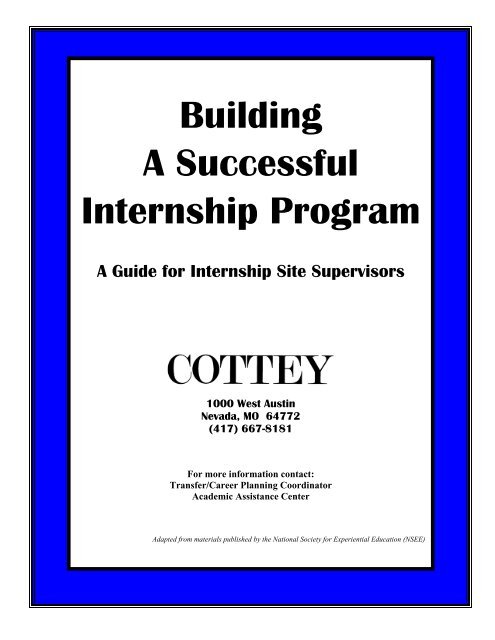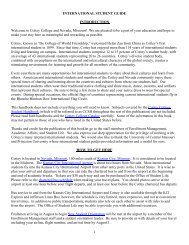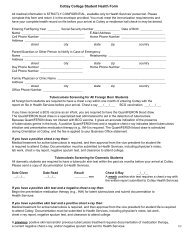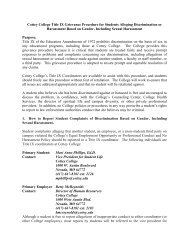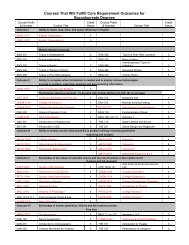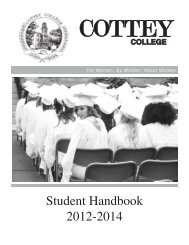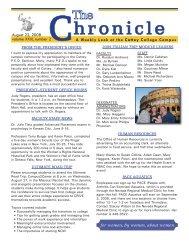Internship Site Supervisor Guide - Cottey College
Internship Site Supervisor Guide - Cottey College
Internship Site Supervisor Guide - Cottey College
You also want an ePaper? Increase the reach of your titles
YUMPU automatically turns print PDFs into web optimized ePapers that Google loves.
Building<br />
A Successful<br />
<strong>Internship</strong> Program<br />
A <strong>Guide</strong> for <strong>Internship</strong> <strong>Site</strong> <strong>Supervisor</strong>s<br />
1000 West Austin<br />
Nevada, MO 64772<br />
(417) 667-8181<br />
For more information contact:<br />
Transfer/Career Planning Coordinator<br />
Academic Assistance Center<br />
Adapted from materials published by the National Society for Experiential Education (NSEE)
COTTEY COLLEGE INTERNSHIP PROGRAM<br />
Hosting an internship can be a rewarding experience for all involved. A successful internship<br />
provides students with an opportunity to apply their classroom learning to the workplace.<br />
<strong>Internship</strong>s also provide host organizations with high-achieving workers who bring fresh<br />
perspectives and ideas. In order for an internship to be successful, the site supervisor, the intern,<br />
and <strong>Cottey</strong> <strong>College</strong> commit to working together to make the most of the opportunity.<br />
What is an internship<br />
An internship is a supervised work<br />
experience, related to a student's major or<br />
area of career interest, with intentional<br />
learning goals. A student may actively<br />
reflect on what she is learning throughout the<br />
experience. An internship includes a training<br />
component, orientation, supervision, and<br />
evaluation. It can be full-time or part-time at<br />
any time of the year. <strong>Internship</strong>s are often<br />
unpaid, but may receive paid compensation.<br />
Checklist for <strong>Internship</strong> <strong>Site</strong> <strong>Supervisor</strong>s<br />
Develop internship position description<br />
Post advertisements at <strong>Cottey</strong> <strong>College</strong><br />
Interview candidates and hire intern<br />
Meet with intern to establish Learning Contract<br />
Provide/supervise orientation and training of intern<br />
Conduct regularly scheduled supervision meetings<br />
Provide end of internship evaluation<br />
At <strong>Cottey</strong>, a faculty member and an internship site supervisor supervise an internship for course<br />
credit. The site supervisor is immediately responsible for the intern and her performance. The<br />
site supervisor completes an evaluation of the intern's performance and progress throughout the<br />
internship. The faculty sponsor is responsible for the evaluation of student learning. The faculty<br />
sponsor awards a grade and credit for the completed internship. The transfer and career planning<br />
coordinator is responsible for supporting the faculty sponsor and internship site supervisor. Most<br />
written communication will come from the transfer and career planning coordinator. For<br />
questions regarding internships, please contact Susan A. Yoss at 417-667-8181, ext. 2132.<br />
What are the benefits<br />
According to a national study done by the National Society for Experiential Education,<br />
94 percent of organizations that hosted interns were satisfied or very satisfied with their interns.<br />
<strong>Supervisor</strong>s valued the interpersonal skills, job-related knowledge, creativity, and writing ability<br />
interns brought to the organization. Employers and organizations benefit in the following ways:<br />
<br />
<br />
<br />
<br />
<br />
<br />
Gain a fresh perspective in ongoing projects and procedures<br />
Access students with special skills and knowledge<br />
Gain enthusiastic and motivated pre-professionals<br />
Develop supervisory skills of staff<br />
Receive assistance with special projects<br />
Increase your organization's visibility on campus and in the community
LAYING THE GROUNDWORK<br />
Before you start an internship, lay the groundwork for its success. <strong>Internship</strong> activities are as<br />
varied as companies are in age, size, industry and product. Design an internship program that<br />
meets your needs.<br />
Step 1: Assess organization goals<br />
A careful discussion with key people in your organization can create a consensus on internship<br />
program goals. <strong>Internship</strong>s can be designed to best meet those goals and expectations. A series of<br />
questions may need answered before hosting an intern.<br />
What does your company hope to achieve from participating in an internship program<br />
o Are you a small company searching for additional help on a project<br />
o Are you a nonprofit that doesn't have a lot of money to pay, but can provide an<br />
interesting and rewarding experience<br />
What human resources do you have to support an intern<br />
o Can your organization invest the time and energy into the intern's learning and<br />
growth<br />
o Can you provide patient support, planning, direction, instruction and<br />
encouragement for the intern<br />
What physical resources do you have to support an intern<br />
o Do you have a safe, adequate workspace with available technology appropriate for<br />
the intern's activities<br />
What could an intern do for you What should be your goals<br />
o What specific skills and preparation are essential for an incoming intern<br />
Step 2: Develop a job description<br />
Once you carefully plan and write out your internship program and goals, draft a job description<br />
that clearly explains the internship duties. A written job description, even if preliminary, assists<br />
in the marketing of the position and recruitment of interns. It also forms the basis of the learning<br />
contract between your organization, the intern, and the faculty sponsor.<br />
A large part of producing effective position descriptions involves the development of challenging<br />
work assignments that complement students' academic programs. As part of the educational<br />
process, internship work activities should focus on projects specifically related to the academic<br />
major and the degree the interns expect to receive. <strong>Cottey</strong> provides an <strong>Internship</strong> Position<br />
Description form that my help you develop a description that is useful to our students.<br />
Step 3: Recruit interns<br />
Begin recruiting interns several months prior to your need. Starting early has advantages: the<br />
longer you accept applications, the better your chance of finding the best person for the job.<br />
Your process for selection of an intern should be similar to recruitment for entry-level<br />
employees. This approach is a learning process for the intern. Your initial screening may (but<br />
not necessarily) include an application, resume, letter of inquiry, and samples of relevant work.<br />
An interview, even by phone, combined with your assessment of the student's application, will<br />
give you a sense of who will be the best fit for the internship.
THE INTERNSHIP<br />
Step 1: Establish a Learning Contract<br />
A successful internship starts with a good plan. The <strong>Internship</strong> Learning Contract lays out a plan<br />
of action for achieving learning goals and assessing progress. It defines the responsibilities and<br />
expectations for all three parties involved to create a satisfying internship experience.<br />
The intern is primarily responsible for developing learning goals, but<br />
will need to consult extensively with the internship site supervisor and<br />
the faculty sponsor. The goals should answer three basic questions:<br />
(1) what do I want to learn, (2) how will I learn it, and (3) how will I<br />
know I'm learning it or have learned it<br />
Check out<br />
"TIPS for Drafting A<br />
Learning Contract."<br />
Step 2: Orient and Train the Intern<br />
Orientation can be a formal or informal process depending on the number of interns and needs<br />
of the organization. Regardless of the structure, there are important elements that should be<br />
included in any orientation program for interns. Plan to include the following in your initial<br />
training:<br />
1. Information · Explain the mission of the organization. Offer interns your organization’s<br />
literature to review and any other documents that may help the intern to understand who<br />
benefits from your product or services. If available, include an organizational chart that<br />
explains various roles and responsibilities of employees.<br />
2. Structure · Outline the organizational rules, policies and expectations. Interns might not<br />
be familiar with formal workplace procedures (e.g., attendance policies, break times, days<br />
off). Discuss specific industry jargon or acronyms. Security or confidentiality issues may<br />
need to be addressed, as well as, access to certain information.<br />
3. Introductions · Take time in the beginning of the internship to introduce the intern to key<br />
people in the organization. Some interns, based on personality or culture, may be<br />
reluctant to seek out co-workers on their own. By making a special effort to encourage<br />
those contacts early on, interns will feel more comfortable asking for advice or support<br />
later.<br />
Training is as important as orientation. Establish a training program that will give the intern a<br />
clear understanding of what is expected, and include information about the duties that will be<br />
supervised and evaluated. Refer to the learning contract that was signed at the beginning of the<br />
internship to assist you. Ongoing training will keep students interested in the position and ready<br />
to tackle new challenges. Ongoing training may include development of specific skills,<br />
supervisor shadowing, encouragement of questions, and participation in professional conferences<br />
or meetings.
Step 3: Supervise<br />
An intern must have a designated site-supervisor who is responsible for providing orientation,<br />
supervision, and opportunities for reflection for the student. This should be someone who will be<br />
available to the student on a regular basis, and possesses expertise in the area in which the intern<br />
will work. Since an internship is defined as a learning experience, proper supervision of the<br />
intern is essential. The supervisor serves as a teacher, mentor, critic, and boss. Ongoing<br />
supervision of the student intern is key to the success of the internship.<br />
General guidelines for effective supervision<br />
<br />
<br />
<br />
<br />
Know your intern's learning objectives. Review the learning contract periodically.<br />
Encourage the intern to reflect on the relationship between the learning objectives and the<br />
work experience.<br />
Provide frequent, specific, descriptive feedback to your intern. Schedule regular meetings<br />
with your intern to review progress on projects, touch base, and provide feedback.<br />
When problems occur, communicate directly with your intern. A face-to-face meeting is<br />
preferable to a written note or even a phone call.<br />
Use the academic support available at <strong>Cottey</strong>. If you question how to deal with a<br />
particular situation, consult your contacts on the academic side. Take advantage of this<br />
resource whenever appropriate.<br />
Step 4: Evaluate<br />
Evaluation is important to an intern's development and is an opportunity to identify strengths and<br />
weaknesses. It is helpful if supervisors evaluate throughout the entire internship, not just at the<br />
end. The evaluation should be structured as a learning experience and an opportunity for bilateral<br />
feedback. Regularly scheduled evaluations help avoid common problems with internships,<br />
including miscommunication, misunderstanding of job roles, and lack of specific goals and<br />
objectives.<br />
Criteria to consider when evaluating an intern are:<br />
<br />
<br />
<br />
<br />
<br />
Progress towards or accomplishment of learning objectives as stated in the learning<br />
contract<br />
Skill development or job knowledge gained over the course of the internship<br />
Overall contribution to the mission of the organization<br />
Dependability, punctuality, attendance<br />
Relations with others, overall attitude<br />
The student will also evaluate the internship experience, which is important in determining the<br />
value of the work experience for future interns.
HOW CAN THE SUPERVISOR WORK MOST<br />
EFFECTIVELY WITH THE INTERN<br />
COMMUNICATION<br />
Clear communication is the key to effective supervision in all internships.<br />
- Clarify intern's role through the formal learning contract (clarify job responsibilities, set<br />
goals, set regular work hours, etc.)<br />
- Schedule regular meetings with the intern to discuss new and past assignments, to<br />
answer any questions, and discuss dynamics of the organization.<br />
- Give the intern opportunity to attend meetings (staff, committee, or legislative) whenever<br />
possible.<br />
- Explain to the intern how decisions are made.<br />
- Structure and supervise the internship more highly in the beginning, and ease off when<br />
the time seems appropriate.<br />
- Remember: Interns need to receive regular descriptive feedback on their progress. Are<br />
they meeting expectations Let them know.<br />
- If problems do occur, speak directly with the intern. If the supervisor is unsure how to<br />
deal with a particular situation, a phone call to the faculty sponsor or the internship<br />
coordinator is recommended.<br />
REWARDS<br />
No rules exist in this area. <strong>Supervisor</strong>s are encouraged to use creativity in rewarding interns for<br />
work well done. Some suggestions include:<br />
- Give the intern opportunities to attend professional seminars and workshops provided<br />
within or by the organization.<br />
- Give them the opportunity to meet the administration, board members, VIPs or director.<br />
- Give the intern the opportunity to interview or observe other departments/areas of the<br />
organization.<br />
- Recognize them for doing things right.<br />
- Note the intern's name on a finished project to give credit and recognition.<br />
- Provide student with contact people known to help in future job hunting.
MOTIVATION<br />
- Make interns feel like a member of the team.<br />
- Challenge the intern and show respect for the intern's talent and abilities.<br />
- Give the intern a designated work area.<br />
- Give interns a sense of planning and involvement by hearing their ideas.<br />
- Select/organize assignments so that progress is observable for interns (the feeling of<br />
making a difference is a big motivator!).<br />
- Give constructive, descriptive criticism.<br />
- Help interns to understand their jobs in relation to other jobs.<br />
COMPLETION<br />
Organizations, colleges, and interns must plan for the internship ending date from the<br />
beginning. It is important to set realistic goals for completing projects and for transferring<br />
them to other personnel. This prevents incomplete work, abandoned clients, and helps to keep<br />
a timeline. A good way to end the internship is by holding some form of celebration. This is a<br />
comfortable means of recognizing the completion of the internship experience.


